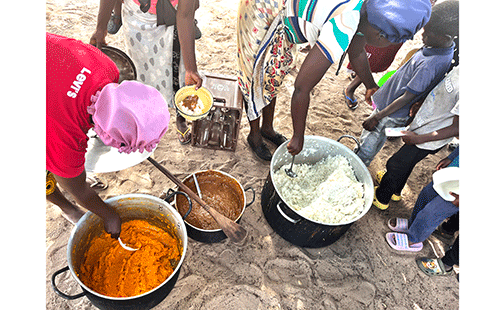Paulina Ndalikokule
GAVA – Alphonsina Kanyanga, a malnourished one-year-old from Gava village in Mpungu constituency, has gained weight since the Gava Soup Kitchen opened a month ago.
Kanyanga weighed only 6.5 kilogrammes at nine months when Catholic AIDS Action, in partnership with the World Food Programme (WFP), recognised her as malnourished, along with 171 other children. This group consists of children aged six months to nine years who are vulnerable or malnourished, and cannot afford three meals per day as required.
Today, the brave little girl can stand on her own, and now weighs 7.5kg since receiving nutritious meals three times a week at the community soup kitchen.
Her unempl oyed mother, 29-year-old Fatima Mununga, said she is pleased that the kitchen is assisting Kanyanga in growing faster, stronger and healthier.
Mununga stated that last year’s drought had a significant impact on their family of seven, forcing them to subsist by selling nongongo oil, which is prepared from dry marula kernels.
“We don’t have a stable income; we have to work in people’s fields to get income. But nobody was cultivating last year, so we couldn’t do any work because there was drought. The introduction of a soup kitchen has taken a burden from us because two of my children are now fed there, which takes off the responsibility of feeding them during the day,” she said gratefully.
Servantius Kakuru, Catholic AIDS Action regional coordinator, stated that the kitchen has improved the children’s livelihoods and saved many from starvation.
“We want them to eat every day. When you see them eat here, they are very happy and free. We thus request that the budget be increased, and we appeal for other donors to add to what the WFP give us” he said.
Kakuru added that they are challenged by children who are not registered turning up at the kitchen; a garden without water; not sufficient food donated by the UN; and children who don’t show up.
Kavango West governor Verna Sinimbo expressed gratitude to the UN representative on behalf of the citizens here for being chosen as one of the regions to receive projects to address hunger and drought.
She emphasised the importance of such programmes reaching even remote areas like Gava, where the implementation has resulted in significant changes in the lives of children, gender-based violence and health-related issues.
“The community has become more informed and proactive in addressing these challenges. We can see the impact, and this we could not do alone. That’s why we need stakeholders such as the UN agencies to meet the government halfway. They are here really to support government initiatives, even though we know we have drought relief programmes,” she said.
She stressed the importance of drawing lessons from these partnerships, and encouraged the community to continue their efforts independently, as external support may not always be available.
The governor urged residents to support community-driven efforts aimed at tackling hunger and other challenges, encouraging them to actively participate in initiatives which benefit their locality.
“We need to empower our people so that we can continue to take our projects to greater heights,” Sinimbo said.
Hopolong Phororo, UN representative coordinator in Namibia, stated that the UN received more than N$56 million for Kavango West last year to supplement government drought relief initiatives, and that the UN’s Central Emergency Response Fund (UNCERF), WFP and UNFPA were deployed to the region as part of a collaborative action amongst various UN agencies to create an integrated strategy to assist those affected.
“UN agencies are working together to ensure that we have joint coordinated programmes to reach a wider audience. Our goal is to not only address the immediate challenges posed by this drought, but also to align our efforts with the Sustainable Development Goals for long-term resilience,” she continued.
Through consultations with government authorities, the region was selected as one of the most badly-affected by drought, guiding resources’ allocation to where it is most required.
Despite the severity of the situation, Phororo expressed hope for the continuing initiatives financed by both the UN and the government.
“The projects we’ve initiated are encouraging. They’ve built a stronger foundation for future interventions, enhancing community resilience against climatic change,” she stated.
*Paulina Ndalikokule is an Information Officer at MICT Kavango West region.



